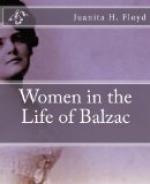Thus was begun the correspondence, and the Duchess ended by lifting her mask and inviting the writer to visit her; he gladly accepted her gracious offer to come, not as a literary man nor as an artist, but as himself. It is a striking coincidence that Balzac accepted this invitation the very day, February 28, 1832, that he received the first letter from l’Etrangere.
What must have been Balzac’s surprise, and how flattered he must have felt, on learning that his unknown correspondent belonged to the highest aristocracy of the Faubourg Saint-Germain, and that her husband was a peer of France under Charles X!
“Madame de Castries was a coquettish, vain, delicate, clever woman, with a touch of sensibility, piety and chaleur de salon; a true Parisian with all her brilliant exterior accomplishments, qualities refined by education, luxury and aristocratic surroundings, but also with all her coldness and faults; in a word, one of those women of whom one must never ask friendship, love or devotion beyond a light veneer, because nature had created some women morally poor.”
At first, Balzac was too enraptured to judge her accurately, but after frequenting her salon for several months, he says of her:
“It is necessary that I go and climb about at Aix, in Savoy, to run after some one who, perhaps, will laugh at me—one of those aristocratic women of whom you no doubt have a horror; one of those angelic beauties to whom one ascribes a soul; a true duchess, very disdainful, very loving, subtle, witty, a coquette, like nothing I have ever yet seen, and who says she loves me, who wants to keep me in a palace at Venice (for I tell you everything), and who desires I should write nothing, except for her; one of those women who must be worshiped on one’s knees when they wish it, and whom one has such pleasure in conquering; a woman to be dreamt of, jealous of everything.”
A few weeks later he writes from Aix:
“I have come here to seek at once both
much and little. Much,
because I see daily a person full of grace
and amiability, little,
because she is never likely to love me.”
Under the influence of the Duchesse de Castries and the Duc de Fitz-James, Balzac gave more and more prominence to Catholic and Legitimist sentiments; and it was perhaps for her sake that the novelist offered himself as a candidate for deputy in several districts, but was defeated in all of them. He thought it quite probable that the Duc de Fitz-James would be elected in at least two districts, so if he were not elected at Angouleme, the Duke might use his interest to get him elected for the place he declined.




